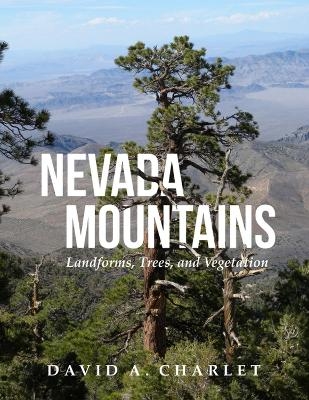
Nevada Mountains
landforms, trees, and vegetation
Seiten
2024
|
1. Auflage
University of Utah Press,U.S. (Verlag)
978-1-64769-153-0 (ISBN)
University of Utah Press,U.S. (Verlag)
978-1-64769-153-0 (ISBN)
Nevada is one of the most mountainous states in the US. Yet mapping out exactly where one range begins and another ends has never been done - until now. In this volume David Charlet provides maps and descriptions for all 319 mountain ranges in the state.
Nevada is one of the most mountainous states in the US. Yet mapping out exactly where one range begins and another ends has never been done—until now. In this volume David Charlet provides maps and descriptions for all 319 mountain ranges in the state.
Divided into three parts, the book presents a simple system recognizing the primary landscape features of Nevada. Part I describes the methods used to define the boundaries of the ranges and divides the state into meaningful landforms. Part II describes the ecological life zones and their vegetation types. Part III describes the individual mountain ranges. Each mountain range entry contains a descriptive narrative and a data summary that includes the county or counties in which the range occurs, whether the author has visited and collected plants there, the highest point, the base elevation, a brief discussion of the geology, any historic settlements or post offices located in the range, the distribution of life zones, and a list of all conifers and flowering trees.
The result of over thirty years of exploration and study throughout the state, this is a long-overdue compendium of Nevada’s mountains and associated flora. This book is a required reference for anyone venturing out into the Nevada wilds.
Nevada is one of the most mountainous states in the US. Yet mapping out exactly where one range begins and another ends has never been done—until now. In this volume David Charlet provides maps and descriptions for all 319 mountain ranges in the state.
Divided into three parts, the book presents a simple system recognizing the primary landscape features of Nevada. Part I describes the methods used to define the boundaries of the ranges and divides the state into meaningful landforms. Part II describes the ecological life zones and their vegetation types. Part III describes the individual mountain ranges. Each mountain range entry contains a descriptive narrative and a data summary that includes the county or counties in which the range occurs, whether the author has visited and collected plants there, the highest point, the base elevation, a brief discussion of the geology, any historic settlements or post offices located in the range, the distribution of life zones, and a list of all conifers and flowering trees.
The result of over thirty years of exploration and study throughout the state, this is a long-overdue compendium of Nevada’s mountains and associated flora. This book is a required reference for anyone venturing out into the Nevada wilds.
David Charlet is professor of biological sciences at the College of Southern Nevada. His Atlas of Nevada Conifers (1996, University of Nevada Press) is a trusted reference book for biologists working in the state. He continues to work with federal and state agencies to produce vegetation maps for Nevada.
| Erscheinungsdatum | 02.03.2024 |
|---|---|
| Zusatzinfo | Illustrationen |
| Verlagsort | Salt Lake City |
| Sprache | englisch |
| Maße | 191 x 279 mm |
| Gewicht | 454 g |
| Einbandart | kartoniert |
| Themenwelt | Naturwissenschaften ► Biologie ► Ökologie / Naturschutz |
| Naturwissenschaften ► Geowissenschaften ► Geografie / Kartografie | |
| ISBN-10 | 1-64769-153-2 / 1647691532 |
| ISBN-13 | 978-1-64769-153-0 / 9781647691530 |
| Zustand | Neuware |
| Informationen gemäß Produktsicherheitsverordnung (GPSR) | |
| Haben Sie eine Frage zum Produkt? |
Mehr entdecken
aus dem Bereich
aus dem Bereich
Grundlagen, Systeme, Anwendung, Wirtschaft
Buch | Hardcover (2024)
Carl Hanser (Verlag)
CHF 139,95


